27 May 2023 : Daily Current Affairs
DAILY CURRENT AFFAIRS
27-May-2023
Daily Current Affairs For UPSC ,Daily Current affairs of The hIndu and Indian Express.
1. Only six religion options make it to the next census form.
GS1 – Society
Context:
- The Government is conducting the census, which was scheduled for 2020-21, but was delayed due to COVID.
- There were demands by several communities to be regarded as separate religions in this census.
- However, the Government is counting only 6 religions separately, i.e. Hindu, Muslim, Christian, Buddhist, Sikh and Jain.
Issue:
- Several communities, such as Karnataka’s Lingayat, Nature worshippers/Adivasis of Jharkhand, Chattisgarh and Odisha, have been demanding to include their Sarna faith as a separate religion.
- However, this demand hasn’t been accepted.
Facts about the Census:
- It will be the first digital census, where respondents can fill out the questionnaire from their homes.
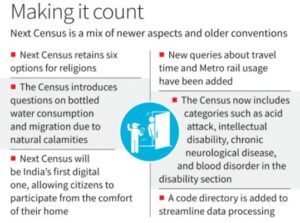
2. IMD retains its normal outlook for Monsoon
GS1: Weather & Climate
Context:
- India Meteorological Department (IMD) has kept its forecast normal between June-September.
- The long-term average in India is 87cm. IMD has predicted 96% of this rainfall for this year.
- Whenever there is a less than 4% variation from the long-term average, the IMD declares it a normal monsoon.
Impact of the El Nino:
- There are chances of El Nino forming this year, which will affect the monsoon.
- Since 2019, India has been under the influence of La Nina.
- El Nino is a situation when the sea surface temperatures at the coast of Peru (South America) increase. This reduces the intensity of monsoons in India. Its converse, La Nina, increases the intensity of rainfall during monsoon in India.
- During this monsoon, Indian Ocean Dipole(IOD) will also play an impact.
The IMD maintains five rainfall distribution categories on an all-India scale. These are:
- Normal or near normal, when the percentage departure of actual rainfall is +/-4% of LPA, that is, between 96-104% of LPA;
- Below normal, when the departure of actual rainfall is less than 10% of LPA, that is 90-96% of LPA;
- Above normal, when actual rainfall is 104-110% of LPA;
- Deficient, when the departure of actual rainfall is less than 90% of LPA; and
- Excess, when the departure of actual rainfall is more than 110% of LPA.
3. EU official seeks to allay India’s concerns on ‘Carbon Tax’
GS3 – Environment
Context:
- Carbon Border Adjustment Mechanism (CBAM) is a tool devised by the EU to put a fair price on the carbon emitted during the production of carbon-intensive goods that are entering the EU.
- Carbon Leakage problem: Over the years, the EU companies have shifted their dirty emission-producing production works outside the EU countries. But, since EU citizens are still consuming those items, the actual emission has not stopped. This is termed as the carbon leakage problem, i.e. more carbon-intensive goods making their way into the EU markets at the expense of domestically manufactured products.
- To encourage cleaner industrial production in non-EU countries, the CBAM is introduced. It is aligned with the phase-out of the allocation of free allowances under the EU Emissions Trading System (ETS) to support the decarbonisation of the EU industry.
Concerns:
- This impacts India too: CBAM will apply to imports of carbon-intensive products, such as steel, iron and aluminium. A higher rate of tax would be charged on these items.
- WTO compliance: This additional tax might be against the WTO free trade rules.
Statement from EU:
- CBAM is only meant to avoid the ‘Carbon Leakage’ problem, according to the EU’s chief climate Negotiator, and Indian Industry must not worry.
- Concern: There is a concern that a tax of 20-35% would be levied on steel, aluminium and cement after the introduction of this mechanism.
- Although EU has assured that CBAM would be WTO-compliant.
4. Indus Water Treaty: Centre advises J&K to scale up efforts for ‘better utilisation.’
GS2 – IR
Context:
-
- Union government has instructed officials in J&K to scale up efforts for better utilisation of India’s rights under the Indus Water Treaty (IWT).
-
A high-level Meeting was held by top officials, including the J&K principal secretary and the Indus commissioner (from the Ministry of External Affairs).
Provisions of the Indus water Treaty:
-
- Control of the rivers:
- Control of 3 Eastern rivers, Ravi, Beas and Sutlej, was given to India for unrestricted usage India before they enter Pakistan. This is used for irrigation in Punjab, Haryana & southern & Western parts of Rajasthan.
- The treaty allocated the 3 western rivers— Indus, Chenab and Jhelum—to Pakistan for unrestricted use, barring certain non-consumptive, agricultural and domestic uses by India.
- Besides, India is also allowed a minimum storage level on the western rivers— it can store up to 3.75 MAF for conservation and flood storage purposes.
- Transitory Provisions:
- In 10 year transition period, India was bound to supply water to Pakistan until it was able to build a canal system from western rivers.
- Pak also received one-time financial compensation for the loss of water from eastern rivers.
- Usage of water:
- India was allowed to use rivers for irrigation, transport & power generation while laying down precise do’s & don’ts for Indian building projects along the way.
- It allows India to build ‘run of the river’ hydropower projects, i.e. the projects that do not require live storage of water.
- It also provides certain design specifications which India has to follow for such projects.
- A commissioner is
- appointed by each country.
- It has a member expert in Hydrology & water use.
- Conflict resolution: The IWT also provides a three-step dispute resolution mechanism, under which issues can first be resolved at the commission or inter-Government level.
- If that fails, either side can approach the World Bank to appoint a Neutral Expert (NE).
- And eventually, if either party is still not satisfied, matters can be referred to a Court of Arbitration.
- Control of the rivers:
For Enquiry

27 May 2023 : Daily Current Affairs
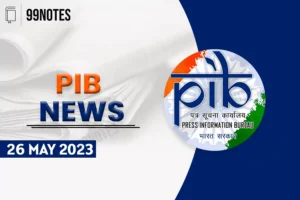
26 May 2023 : PIB
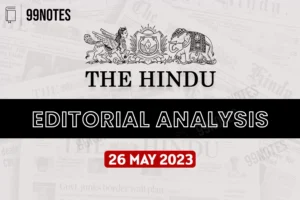
26 May 2023 : The Hindu Editorial

26 May 2023 : Daily Current Affairs
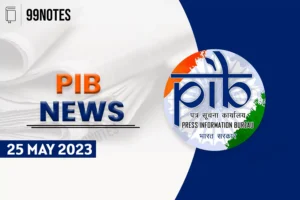
25 May 2023 : PIB
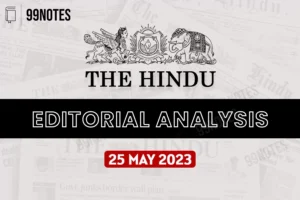
25 May 2023 : The Hindu Editorial

25 May 2023 : Daily Current Affairs
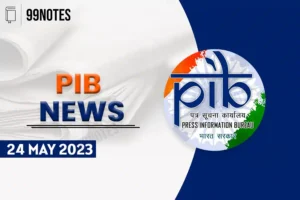
24 May 2023 : PIB
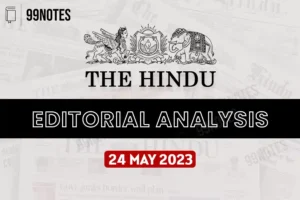
24 may 2023 : The Hindu Editorial

24 May 2023 : Daily Current Affairs
Daily Current Affairs 27 May 2023 : Daily Current Affairs DAILY CURRENT AFFAIRS
27-May-2023
Daily Current Affairs For UPSC ,Daily Current affairs of The hIndu…
PIB 26 May 2023 : PIB PRESS INFORMATION BUREAU
26-May-2023
Daily Current Affairs For UPSC ,The PIB ( Press Information Bureau…
The Hindu 26 May 2023 : The Hindu Editorial The Hindu Editorial
26-May-2023
Daily Current Affairs For UPSC ,The Hindu Editorial Summary
Facebook-f
Twitter
Youtube…
Daily Current Affairs 26 May 2023 : Daily Current Affairs DAILY CURRENT AFFAIRS
26-May-2023
Daily Current Affairs For UPSC ,Daily Current affairs of The hIndu…
PIB 25 May 2023 : PIB PRESS INFORMATION BUREAU
25-May-2023
Daily Current Affairs For UPSC ,The PIB ( Press Information Bureau…
The Hindu 25 May 2023 : The Hindu Editorial The Hindu Editorial
25-May-2023
Daily Current Affairs For UPSC ,The Hindu Editorial Summary
Facebook-f
Twitter
Youtube…
Daily Current Affairs 25 May 2023 : Daily Current Affairs DAILY CURRENT AFFAIRS
25-May-2023
Daily Current Affairs For UPSC ,Daily Current affairs of The hIndu…
PIB 24 May 2023 : PIB PRESS INFORMATION BUREAU
24-May-2023
Daily Current Affairs For UPSC ,The PIB ( Press Information Bureau…
The Hindu 24 may 2023 : The Hindu Editorial The Hindu Editorial
24-May-2023
Daily Current Affairs For UPSC ,The Hindu Editorial Summary
Facebook-f
Twitter
Youtube…
Daily Current Affairs 24 May 2023 : Daily Current Affairs DAILY CURRENT AFFAIRS
24-May-2023
Daily Current Affairs For UPSC ,Daily Current affairs of The hIndu…


